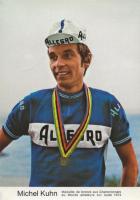Michel Kuhn was born on 9 January 1949 in Fribourg, Switzerland. He attended primary school in nearby Villars-sur-Glâne and secondary school in Fribourg, finishing in 1965. After around two years of vocational training, Michel started an apprenticeship at a local chemistry and physiology institute, where he worked as a machine mechanic until 1971. He then completed two years of military service, emerging in 1972 with the rank of lieutenant. That same year he was hired by Siemens, in Zurich, as a technician for telephone switchboards. A couple of years later he took the opportunity to move to the company’s Bern office and use his skills as a worksite planner. In 1978 he left Siemens and went back to the army for a year.
Alongside his nascent professional career, Michel was a competitive cyclist, riding for the Swiss national team from 1969 to 1977 – he won the bronze medal at the 1974 UCI Road World Championships in Montreal. Much of his travel during this period was for competitions: three months in Mexico in 1970; two months in Singapore, Thailand and Malaysia in 1974; one month in Bulgaria in 1975; and, in 1976, one month in the Canary Islands and Mexico, one month in East Germany, Poland and Czechoslovakia, and one month in South Africa. He also spent time in France, Italy, Belgium, Germany and Canada. Michel happily engaged in non-wheeled activities as well, such as climbing, sailing, fishing and skiing.
In 1979, after his second, year-long stint in the army – from which he emerged as a captain – Michel went to work for Allegro, a Swiss bicycle manufacturer in Neuchâtel, as deputy head of sales in charge of customer relations and planning. In mid-1980 he decided that he would go to England the following April to improve his English. In the meantime, he was hired by Frischflor, a German company, to temporarily manage its flower import operations in Switzerland while the firm sought a buyer. Michel went to England as planned, and it was from Exeter that he applied to the ICRC in December 1981.
Michel was hired by the organization in April 1982 and sent on his first assignment two months later. He went to Lebanon as a tracing delegate, a position that entails searching for and identifying missing people, and helping reunite family members, in conflict situations. That 11-month mission was followed by two more with similar duties, first in Syria (July to October 1983) and then back in Lebanon (October 1983 to November 1984). In December 1984 Michel started what would end up being his longest assignment, heading to Iran as a tracing coordinator. Just under three years later, Michel was posted to Namibia as head of subdelegation (September 1987 to January 1989). He then played a similar role in Kenya, from February to October 1989. In view of his growing experience, the ICRC came to consider Michel a high-potential delegate able to take on increasing levels of responsibility.
Michel then began his final assignment dedicated to tracing activities, working in Afghanistan from November 1989 to May 1991. He was deeply appreciated by his supervisor, who described him as highly motivated, a pleasure to work with, organized, discreet and respectful of others. In May of that year, Michel was posted to Teheran as the deputy head of delegation where he managed all aspects of the delegation’s relief work, coordinated PoW repatriations and oversaw the launch of various activities in western Afghanistan. That assignment ended in March 1992 when the ICRC was forced to leave Iran.
In his next mission Michel served as head of mission in Azerbaijan (April to September 1992). He then fell sick and was bedridden for several months. Happy to get back to work, he was sent to Tajikistan in March 1993 as a delegate, helping to open an ICRC subdelegation. His subsequent posting was in Azerbaijan, and he was scheduled to fly out of Khorog, in south-eastern Tajikistan, on 28 August 1993. It was a Saturday morning, and his plane, which was carrying too many passengers, crashed soon after take-off. Almost everyone on board was killed, including Michel, who was 44 years old.
When Michel joined the ICRC, he was older than many new delegates, and he brought with him a depth of experience in both the business and military spheres. But it may be his traits as a competitive cyclist – tenacity, perseverance and rigor, not to mention team spirit – that served him best as a humanitarian worker. He was posthumously awarded the Henry Dunant Medal in 1993 in recognition of his outstanding service to the ICRC.
